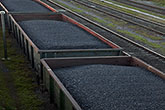UK dry bulk terminals face uncertain future
Published by Jonathan Rowland,
Editor
Dry Bulk,
The vast majority of UK bulk terminals face an uncertain future, according to the Association of Bulk Terminal Operators (ABTO), as imports of key dry commodities dry up following the closure of a number of coal-fired power plant and a fall in steel production.
UK dry bulk terminals had pinned their hope on an uptick in demand for biomass imports as coal-fired power plants converted to burn the cleaner fuel. But government support for such project has stalled, resulting in much lower biomass imports that expected.
“The drop-off in coal imports has not been replaced with biomass on the scale required to support the UK’s bulk terminal operators,” said Justin Atkin, Member of the Advisory Panal to ABTO and Managing Director of Ragged Edge Recruitment & Consulting.
In addition, the closure of some UK steel mills has resulted in a decline in iron ore and metallurgical imports.
“The UK’s deepwater terminal need to identify alternative bulk trades or consider adapting to handle new commodity flows,” continued Atkin. “Grain is one option, but this is hugely dependent on a number of variables, such as currency fluctuations and the weather, and will never deliver the same levels of throughput as enjoyed with coal and iron ore.”
Other opportunities exist for the import of materials used in construction, such as gypsum or cement, but “these commodities require specialist handling and storage with will mean that terminals will have to invest heavily in new bulk handling systems and technologies,” said Atkin.
Read the article online at: https://www.drybulkmagazine.com/ports-terminals/14112016/uk-dry-bulk-terminals-face-uncertain-future/
You might also like
North American rail traffic sees gains
The AAR has reported US rail traffic for the week ending 20 April 2024.

